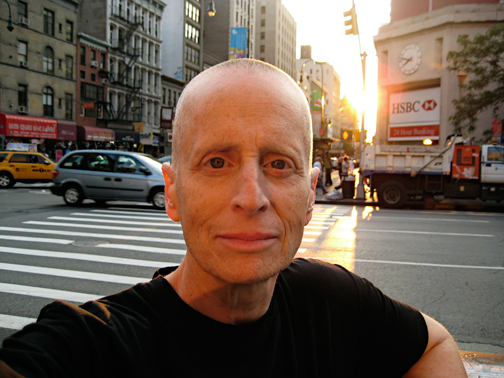
Feinberg, Leslie. “self-portrait in setting sun” https://www.flickr.com/photos/transgenderwarrior/3737033220/in/album-72157622084637003/
Leslie Feinberg (1949-2014) was a self-identified “antiracist, white, secular Jewish, working-class, transgender, butch lesbian female.” 1 Zie was a revolutionary communist, interested in connecting different social movements in the interest of liberation for all 2 Feinberg devoted hir life to connecting the LGBTQ+ movement to other movements for liberation, through hir writing, speeches, and other activist work.
In 1994, Leslie Feinberg published the pamphlet, Transgender Liberation: A Movement Whose Time has come, which laid out a historicized Marxist analysis of transgender identity over the course of centuries.Feinberg defines transgender people as “gender outlaws”: those who do not fit into man-made constraints of gender identity, and as an expressly political and politicized community. The brochure calls for solidarity between transgender people and with other marginalized communities in fighting for liberation for all. At the end of the brochure, zie writes,
The institutionalized bigotry and oppression we face today have not always existed. They arose with the division of society into exploiter and exploited. Divide-and-conquer tactics have allowed the slave-owners, feudal landlords and corporate ruling classes to keep for themselves the lion’s share of wealth created by the laboring class. Like racism and all forms of prejudice, bigotry toward transgendered people is a deadly carcinogen. We are pitted against each other in order to keep us from seeing each other as allies. Genuine bonds of solidarity can be forged between people who respect each other’s differences and are willing to fight their enemy together. We are the class that does the work of the world, and can revolutionize it. We can win true liberation. The struggle against intolerable conditions is on the rise around the world. And the militant role of transgendered women, men and youths in today’s fight back movement is already helping to shape the future. 3
May this quote and Leslie Feinberg’s life work remind us to act in solidarity and in struggle in order to win true liberation for all.
For more information on Feinberg, and a more comprehensive list of hir work, see hir website at http://transgenderwarriors.net. To download a free copy of Stone Butch Blues or order a copy at printing cost, go to http://lesliefeinberg.net To see Feinberg’s flickr albums zie created while treating lyme disease before hir death in 2014, see https://www.flickr.com/photos/transgenderwarrior/sets/. For more readings and resources, please see my bibliography.
- Ben Power Alwin, “Feinberg, Leslie,” in The SAGE Encyclopedia of Trans Studies, 2 vols. (Thousand Oaks: SAGE Publications, Inc., 2021), 252–53, https://doi.org/10.4135/9781544393858. ↩
- note on pronoun use: Leslie Feinberg used selective pronouns according to where s/he was speaking. At specifically trans events, Feinberg often used he/him; at more public events, Feinberg used she/her more often, as s/he did not want to pass as male as a political statement. With long term partner Minnie Bruce Pratt, Feinberg used she/her due to the importance of their relationship being a lesbian relationship. The sexual minorities archives uses a range of pronouns for Feinberg when discussing the Leslie Feinberg Library, most often ze/hir or they/them, while understanding and respecting the fullness and complexity of Feinberg’s identity. Throughout this site, I will use zie/hir pronouns. For more on pronoun usage and the collection, see Ben Power Alwin, “Interview: How Leslie Feinberg’s Personal Research Library Came to The SMA,” Sexual Minorities Archives (blog), February 26, 2018, https://sexualminoritiesarchives.wordpress.com/2018/02/26/interview-how-leslie-feinbergs-personal-research-library-came-to-the-sma/. ↩
- Leslie Feinberg, Transgender Liberation: A Movement Whose Time Has Come (New York, NY: World View Forum, 1992), https://www.workers.org/books2016/Feinberg_Transgender_Liberation.pdf. This is essential first reading for anyone understanding Feinberg’s Marxist framing of hir work. ↩